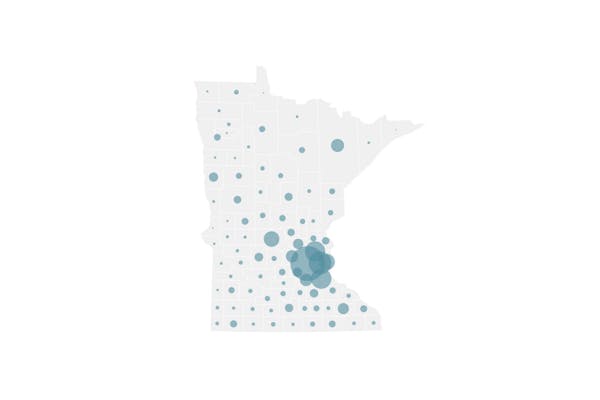More than 1,200 people with COVID-19 are in hospital beds in Minnesota, which is facing an escalating surge of the pandemic.
Rising infection numbers have increased the pressure on hospitals, with the Minnesota Department of Health on Tuesday reporting 23 new deaths and 4,906 new infections with the coronavirus that causes COVID-19. Totals in the pandemic are 2,698 deaths and 189,681 confirmed and probable infections.
Diagnostic testing has increased, with Minnesota adding its latest free saliva testing sites at the Minneapolis Convention Center and the MSP Airport. However, the positivity rate of diagnostic testing has reached 12% — up from 5% just a month ago — indicating an increased rate of viral transmission regardless of the amount of testing.
The single-day record of hospitalizations with the infectious disease includes 249 people placed in intensive care due to breathing problems or other complications, according to the state's pandemic response dashboard.
Doctors and nurses have reported shortages of intensive care beds in the Twin Cities and long waits for patients in emergency rooms before they are admitted or transferred to hospital beds. The state dashboard lists some excess capacity, though, as only 1,079 of an immediately available 1,452 ICU beds are filled with patients who have COVID-19 or unrelated medical issues. The state dashboard also lists another 408 ICU beds that could be readied in 72 hours.
Minnesota continues to have a lower rate of new infections than all of its border states.
North Dakota has the nation's highest rate of 1,770 new infections per million people per day, and its governor this week announced that nurses with asymptomatic infections can remain on the job rather than quarantining themselves and leaving hospitals short-staffed.
The rates are 1,366 in South Dakota and 1,017 in Wisconsin, according to the COVID Exit Strategy website. Minnesota's infection rate has risen to 790 — a level that the neighboring Dakotas and Wisconsin were reporting a few weeks ago.
Young adults have suffered many of the infections in Minnesota, but health officials said they have helped to spread the virus to people at greater risk of severe COVID-19 due to their age or underlying health problems.
More than 80% of COVID-19 deaths in Minnesota have involved people 70 or older. Among the deaths reported Tuesday, 21 of 23 involved people 70 and older. Fourteen involved people who lived in private residences and nine involved people who live in long-term care facilities.
Jeremy Olson • 612-673-7744

Want to share info with the Star Tribune? How to do it securely

'Safe recovery sites' would offer syringes, naloxone and more to people using drugs. The plan could be in peril.
New Minnesota GOP leaders seek peace with party's anti-establishment wing

Who is Republican Lisa Demuth, Minnesota's first House speaker of color?

